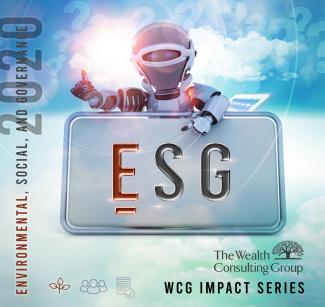
WCG Impact Series: Sustainability doesn’t mean Green
WCG Impact Series: Sustainability does not mean Green
ESG -- Three letters with (what seems like) a million meanings. ESG is an acronym for Environment, Social, and Governance, - These three categories are commonly looked upon to indicate a company's sustainability.
Now, let us *stop here* for a moment, and define 'sustainability' - We have a tendency to correlate the word 'sustainable' with all things green, but when we talk about the sustainability of a company, we are referring to much more than that. In order for a company to sustain in competitive markets, it must be managed responsibility, it must be able to withstand volatile times, and it must be able to retain its employees. Sustainability goes hand in hand with longevity, trust, and reliability.
So with this definition of sustainability in mind, lets circle back to what this means for ESG. When you're looking at a company you want to invest in, essentially voting for that company with your dollars, things like longevity/trust/reliability.. and 'sustainability' may be important factors to take into consideration. ESG screens are nonfinancial factors that are used to rank and score a company based on their environmental and social impacts as well as their corporate governance1. Is a company mindful about its CO2 emissions, resource management, and waste? Does this company value diversity and inclusion? Is this company transparent about their supply chain? What is the pay gap between the board and the front-line workers? These are the types of questions ESG screens use for their rankings and numerous studies have shown that integrating ESG screens into financial analysis can help mitigate risk and enhance returns2.
Here is where it can get a little tricky - ESG is one of the newer terms used in the sustainable finance space. You may be familiar with terms like Socially Responsible Investing (SRI) and it is important to note that SRI does not spell ESG. This is probably the biggest misconception I've seen working with different advisors. Many investments that integrate SRI parameters use exclusionary screens which remove companies and/or sectors that don’t align with socially responsible values (these values can vary, which adds to the confusion)3. ESG screens do not exclude companies and/or sectors based solely on what they produce or manufacture, but instead ranks the company based on environmental, social, and governance behaviors4.
This is not to say that one type of screen is better than another, it is just important to acknowledge the differences. To take a deeper dive into ESG, sustainable investing, and our WCG High Impact Portfolios (which incorporates ESG screens as part of our analytics), reach out to your local WCG advisor. To learn more about WCG, our team, and our mission to support conscious capital click here. For inquiries about how to get involved please click here.
This material is for general information only and is not intended to provide specific advice or recommendations for any individual.
An Environmental, Social and Governance (ESG) fund’s policy could cause it to perform differently compared to funds that do not have such a policy. The application of social and environmental standards may affect a fund’s exposure to certain issuers, industries, sectors, and factors that may impact relative financial performance — positively or negatively — depending on whether such investments are in or out of favor.
Sources:
1 Sinha, Ria, Manipadma Datta, and Magdalena Ziolo. 2019. Effective Investments On Capital Markets.Springer, Cham.
2 Lefkovitz, Dan. “ESG Investing Performance Analyzed.” Morningstar Product Insider,March 12, 2019.
3 Chandler, David, and William B. Werther. Strategic Corporate Social Responsibility: Sustainable Value Creation.Vol. 4. Los Angeles: SAGE, 2017.
4 Filbeck, Aaron, Greg Filbeck, and Xin Zhao. “Performance Assessment of Firms Following Sustainalytics ESG Principles.” The Journal of Investing28, no. 2 (January 2019).

